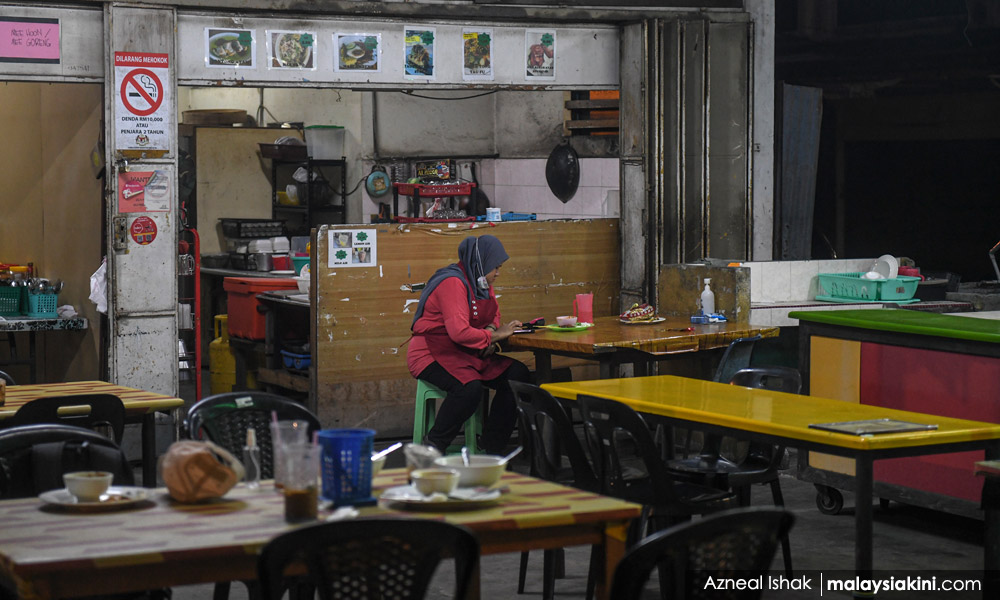
Rafizi defends call for consumers to be picky to bring down prices
Economy Minister Rafizi Ramli today defended his call for consumers to use market forces in bringing down the prices of prepared food and beverages.
According to him, data shows that prices charged by food retailers, especially restaurants and hotels, have continued to shoot up even when costs for raw items in the market had been stabilised.
Rafizi (above) said it is his duty as the minister in charge of the economy to make sure that when the supply and cost for raw materials have returned to normal, and inflation rate has come down, the decrease is reflected in the consumers' benefits.
"If the government has used its resources and intervened to stabilise prices, we also want to make sure that when costs for raw items are down, the prices charged to consumers also go down proportionately.
"So far, data shows this has not happened," he told a press conference in Putrajaya this afternoon.
The presser was held to announce the Consumer Price Index (CPI) for 2022.

Rafizi said the government had forked out about RM2 billion to control the prices of chicken and eggs last year, but despite having spent billions, the prices charged to consumers for prepared food did not change accordingly.
According to him, the country recorded a 3.3 percent inflation rate last year, higher than the usual two percent in previous years.
The increase in prices of prepared food and beverages, especially at restaurants and hotels, has been identified as inflation's main contributor.
"Even when all other components in the CPI have decreased moderately (menyederhana), prices of food and beverages (sold by retailers) have gone up even higher.
"When costs for raw ingredients increased by two percent, the hike of prices in restaurants, hotels and other (food retailers) went by seven percent. That’s more than three times the increase in raw items.
"Although this is not something that is popular for me to talk about, it is my responsibility to do so, because we need to make sure that the rakyat are not burdened by high prices continuously," he said.
The minister told reporters that enforcing a ceiling price is not the only way to bring down market prices, and the rakyat as consumers can also play their role by being picky.
Use your power as consumers
This would create healthy competition among retailers and consumers would get the best value for what they pay.
Rafizi gave an example of a hot Milo beverage, saying that some outlets would charge RM2.50 per cup and consumers had already accepted it as normal.
This, he stressed, was what made retailers keep the price at that level despite changes in their costs margin.
"Once we have price awareness, then we will be more selective in our consumer behaviour. And this is one of the components of the price control mechanism.
"Controlling prices is not only about enforcing ceiling prices. Price awareness is also one of them. It is a way that retailers will react."
Meanwhile, asked about the issue of inflation and cost of living being politicised, Rafizi said he does not see them as a political issue.
He also said it was up to the opposition or anyone if they want to make the issues political, as he is confident that the rakyat knows better.
"The rakyat are more intelligent today, they know all the figures and they can compare.
"This is why we are continuously making efforts to address the cost of living and at the same time, communicating with the rakyat, so they know that we are trying our best,” the Pandan MP mentioned.
Increasing consumer awareness on buying wisely , and comparing competitive prices before buying is definitely a tool for fighting inflation and ensuring a competitive market.
ReplyDeleteBallooning prices for prawns and seafood just before Chinese New Year are a good example. It's not purely Supply and Demand at work.
Prices are often "Goreng" upwards by sellers, as an opportunistic exercise , as they assume consumers will buy regardless even with inflated prices.
I remember the forced importation of Mandarin oranges through a government-appointed monopoly years ago...that year many Chinese knowingly forwent Mandarin Oranges... The crony monopoly attempt was never again repeated.
For food and goods that are not "essential" - you won't go hungry or lose out on important necessities if you avoid buying them, consumers can definitely impact the selling price.
Malaysia does not have a competitive market economy and sellers often take consumers for a ride.
Having said that, many other factors are involved in what makes a competitive price.